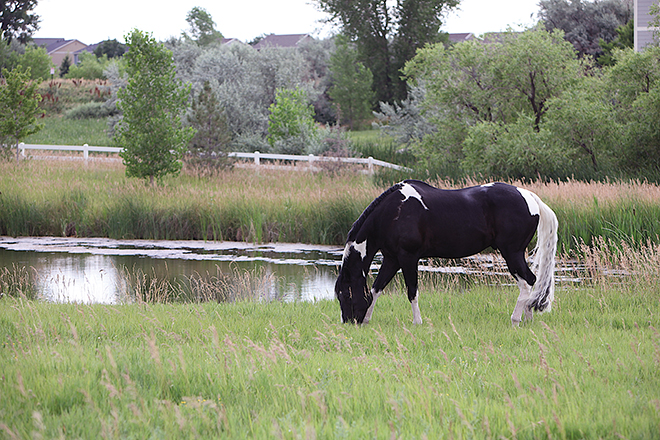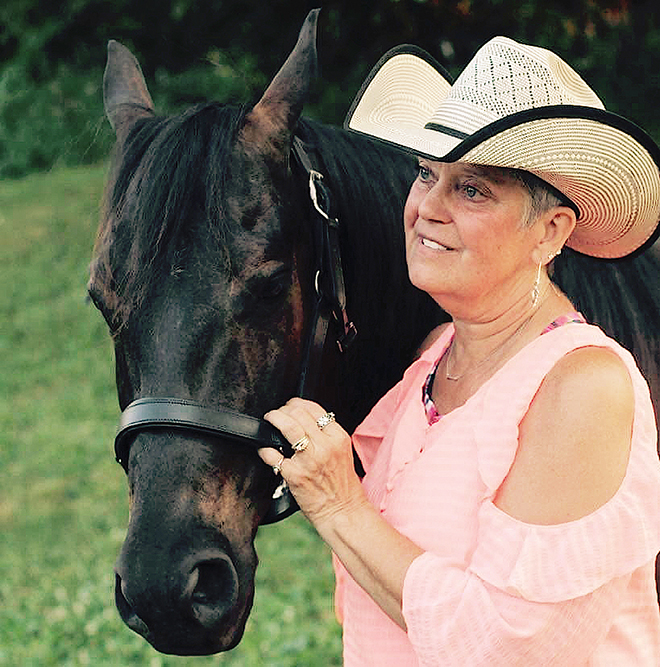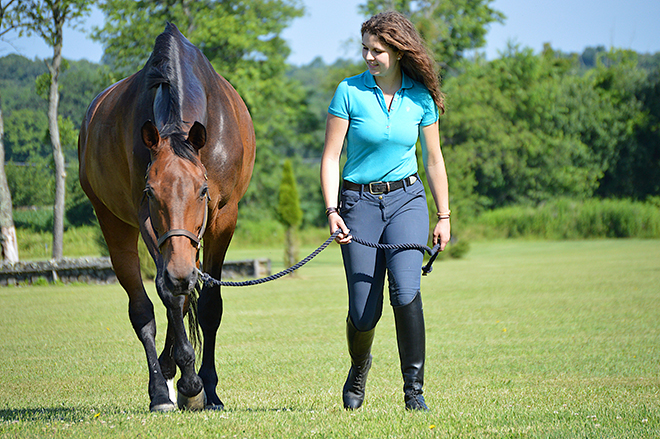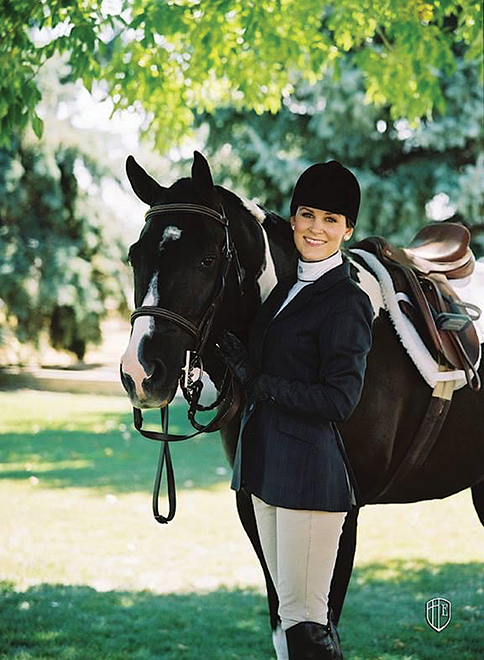As horse owners, we have been taught that they are by nature herd animals. In nature, they live in small groups or bands. But owning even a single horse is costly. So, is it really necessary to own two, or three or a dozen?
Life is easier with a single horse, especially on the pocketbook, says Sherri Oswald of Corcoran, Minnesota, who has competed at open, American Quarter Horse Association (AQHA), American Paint Horse Association (APHA) and Pinto shows in all-around events. Recently her attention has been focused on Reining, Sorting and Ranch classes. She has owned horses for over 30 years and for the past 15 years has had only one horse at home. Sherri currently owns a 6-year-old AQHA Foundation bred gelding, Mister Smart Nic or “Asher” as Sherri and her husband, Todd, call him, who has no problem living as an only horse. He has no neighboring horses; a lazy barn cat, who ignores him; and a 4-pound Chihuahua who steers clear of the barn but travels along to the shows.
A One-Of-A-kind Personality
The bad and good news about a horse living alone is that some just aren’t cut out to handle life alone and others tend to cope well, says equine behaviorist and professor at Texas A&M University Bonnie Beaver, BS, MS, DPNAP, DACVB.
“Although there are no guarantees that any particular horse will adapt and learn to live by themselves, a little observation will yield cues about which type of personalities may have an easier time alone,” she explained. “A horse who separates from a group without hesitation and has more fight than flight is generally more self-assured by nature and apt to have coping skills to be on their own.”
Fortunately, for the Oswalds and the “only horses” they have had over the years, suffered no sickness or injuries. It’s been a blessing for Todd and Sherri to dodge destructive or bad behaviors, withdrawal from life or lack any joy all owners wish for their horse.
“You have to take the time to really get to know your horse,” Sherri said. “I think one of the main reasons I’ve been successful with having one horse is that I spend a lot of time with them so they don’t feel lonely. I also don’t have to worry about separating two horses and the stress that goes along with that. Todd isn’t stuck at home taking care of one when I travel to shows.”
A Safe Environment
A horse’s surroundings have a strong influence on their happiness and security to feel comfortable alone. If there is a safe, established turn out paddock, barn or pasture that the horse is used to then there’s a reassurance and healthy well-being associated in those areas,” explained Beaver.
Part of providing a safe environment is understanding what makes a horse comfortable and what causes stress.
Sherri learned that with a horse she owned prior to Asher. She purchased Send Bello Rosito, a then 4-year-old APHA mare when she decided she wanted to show on the Minnesota Pinto Horse Circuit. The first winter, Sherri boarded Rosita so that she could have access to an indoor to properly condition for her upcoming show season. She brought her home in the Spring and never had a problem.
“She preferred to not be too close to other horses,” Sherri said. “She enjoyed and thrived on her privacy and my one-on-one relationship with her. Not once did I see signs of stress or depression reactions when she lived alone with us.”
While Sherri did have some help from a trainer with Rosita from time to time, she continued to do most everything herself and hauled to shows alone.
“I put Rosita in my trailer with a hay bag to hang out. I found what worked best for her and formed routines to ensure she felt safe and well-taken care of away at shows or just at home,” she explained.
That (2017) year they earned the title of year-end Reserve Champion Novice Amateur in Minnesota.
Dr. Peter Morresey is a graduate of Massey University in New Zeeland who also attended the University of Florida for a Theriogenology residency, followed by a large animal internal medicine residency and currently is in private practice at Rood and Riddle Equine Hospital in Lexington, Kentucky. He says “you can take the horse out of the wild but you can’t take the wild out of the horse.”
“Prior to domestication, the horse was a free-ranging herd animal grazing on grasslands unrestricted to migrate to wherever resources and conditions were more favorable,” he explains. “Owners who can closely duplicate a horse’s natural state may have less negative behavioral and physical problems with their horse.”
Horses, no matter if they live in a large herd or by themselves, can develop undesirable coping mechanisms as a way to self-soothe through the physical and mental stress of everyday life. If the nature of a behavior becomes distorted with discomfort is can become a habit. Behaviors like pacing, circling, pawing, weaving, cribbing and wall kicking are usually observed in a stall but can happen anywhere a horse spends time. These reactions can be from anxiety associated with confinement, separation and anticipation and can cause lameness, stress on joints, abnormal hoof wear, uneven muscle development, teeth and mouth damage, weight loss, ulcers and other GI upsets, performance and training issues.
Dr. Morresey said horses with repetitive behavior tendencies can become addicted to the release of endorphins from their brain, just like any opiate, which proves to be very difficult to treat.“There are medications that can be used that range from short to long-acting calmatives like Reserpine and Fluphenazine, progestins (Altrenogest), and plant-based pharmaceuticals and milk derived proteins (caseins) have recently been introduced to the market,” he said. “However, all have the ability to alter behavior in unfavorable ways.”
A Companion’s Influence
Beaver says sooner or later, owners who have one horse will look into a goat for companionship.
“It’s tempting because goats are also herd animals, yet they’re much more affordable to keep compared to another horse,” she explained. “A horse can only do horse things, and a goat can only do goat things, and so on with other species, which makes bonding not exactly the same.”
Sometimes a goat solves the companionship issue and sometimes it doesn’t. Donkeys can also be a good alternative, as fellow equines, they can mimic the horse-to-horse relationship that a herd provides.
“People I know who have a donkey companion say they have a calming effect on a horse,” Beaver said. “There are plenty of successful examples of horses buddying up to chickens, cats, dogs, rabbits and other unlikely animals too. It’s all about finding the right fit, and those can surprise you.”
Quality Over Quantity
For Lucile Vigouroux, owner of ProPulsion PEMF, a physical therapy business for horses, riders and pets based in Dutchess County, New York, owning just one horse provides you with the benefit of being able to invest all your time, energy and resources into one animal.
“Quality over quantity is key, especially as a busy professional,” said Vigouroux, who owns Claire, a happy and adjusted 17-year-old hunter jumper Westphalian mare. Claire sustained an injury last year which has kept Vigouroux out of the saddle, but otherwise, that’s been the only setback so far to having one horse.
Losing One
Amy Peterson, of Brighton, Colorado, discovered her once-in-a-lifetime horse in the APHA gelding Rock Star Tuxedo (Tux) when she was just 15 years old. He has been an only horse off and on for many years.
“He’s 16-years old now and we still love the show pen,” she said. “This time, Tux has been an only horse since January when I lost my 3-year-old filly, Blue Skies N Alibis (Jedi) to a freak pasture accident.”
Sired by Black Rock Star and out of UR So Royal, Tux has helped Peterson compete in everything from goat tying to jumping and together they have earned 1,178.5 APHA points.
“Our best classes are Showmanship, Equitation and Jumping classes,” Amy said. “Our greatest accomplishment came in 2012 when we earned APHA World Championships in Junior Amateur Horsemanship and Bareback Horsemanship and a Reserve Championship in Hunter Hack.”
The first few weeks after Peterson lost her filly, she remembers Tux acting mopey and distant.
“He handled being an only horse well in the past so I just gave him time and together we started to heal and adapt to life without Jed,” she explained. “After a few weeks, Tux came back around to his normal perky self.”
Peterson said Tux has never had any health issues, but to be safe he was put on ulcer medication during the time he was grieving and is now on a pro-bio supplement for maintenance.
“Tux never shows signs of being lonely, even after I take him places with other horses,” she said. “He doesn’t act overly interested or upset when we leave.”
Peterson changed Tux to a free choice grass diet and made sure he has plenty of time in the pasture to graze. The free choice grass hay made a big difference in his outlook of life because he no longer had to wait to be fed which stopped any hungry feeding time stress.
“He is always ready to go for a ride anytime I am,” Peterson said. “I make sure he gets extra attention and has different things to do. We have our own routines and there isn’t anything better then to have my horse greet me when I make my way outside or come home.”







You must be logged in to post a comment Login